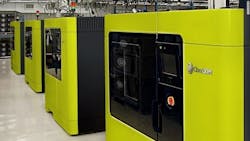UPS Store Offers 3-D Printing to Stay Ahead of the Logistics Curve
The UPS Store was one of the first retailers to offer 3-D printing service in-store back in September 2014 after testing the service in six markets across the country. The six locations saw demand for 3-D print continuing to increase across a broad spectrum of customers, the company said.
And this is not a fad, as last year the 3-D print service provider sector increased by 21% last year, according to The Wohlers Report 2014.
Currently the company offers 3-D printing at over 100 stores using the Stratasys uPrint SE Plus which is a professional grade 3-D printer designed to produce complex engineering parts, prototypes, and one-of-a-kind objects. The time it takes to print an object will depend on the complexity of the design. A simple object may take 4-5 hours, while a complex object may take 24 hours.
During the 2013 pilot program, the 3-D print services were used by small businesses, startups, inventors, artists and a wide range of professionals to transform their ideas into reality. From inventors who patented innovative product designs to entrepreneurs who prototyped an idea and successfully delivered a retail-ready product to market, there were many success stories.
“We are committed to offering small business owners, entrepreneurs and consumers high-tech solutions in order to assist with all of their business needs,” says Michelle Van Slyke, vice president of marketing and sales at The UPS Store. “We look forward to being a part of the future of the 3-D printing industry.”
To support this business line the company announced in May that a startup called CloudDDM would be introducing a full-scale manufacturing facility within UPS’s worldwide air hub, located in Louisville, KY. CloudDDM, whose customers include Whirlpool Corp., GE Aviation, GoPro Inc., offers industrial-grade parts, functional prototypes and less-than-1,000 unit manufacturing runs.
CloudDDM operations manager Ace Herrera spoke to David Mann, of Louisville Business First. "What we're printing is basically anything anybody orders," he says. “Customers go to the company's website and upload part designs to be printed. They go through several options for materials and so forth. Once they're done, a printer in Louisville is queued to start their job.
"The idea of this was to get customers parts as quickly as possible," Herrera says, noting that a truck can leave its facility at 1 a.m. and make a delivery to a customer by 9 a.m. "We wanted to be an end-of-runway solution."
UPS wants to find out if 3-D printing centers could shorten supply chains and cut into its $58 billion-a-year transportation business—or give it a leg up in a potentially emerging market for local production and delivery, explains Lindsay Ellis and Laura Stevens in an article on wjs.com.
The logistics company needs to pay attention to the 3-D printing trend as it “doesn’t want 3-D printing to disrupt its business the way the Internet pulled the rug out from overnight document deliveries more than a decade ago,” contends Ellis and Stevens.
Material Handling & Logistics is an IndustryWeek companion site within Penton's Manufacturing & Supply Chain Group.
